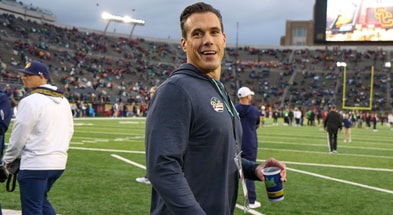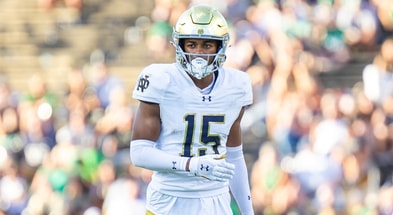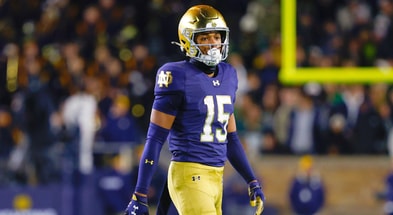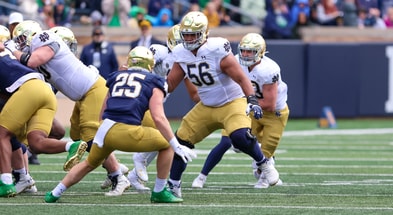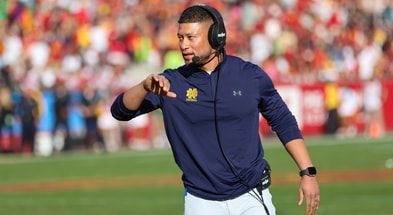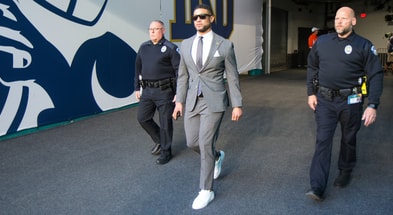Everything strength coach Loren Landow said in first Notre Dame press conference
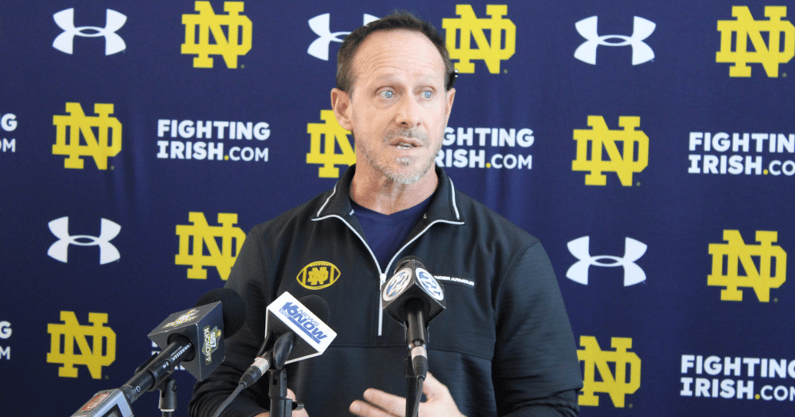
New Notre Dame strength and conditioning coach Loren Landow met with the media for the first time in South Bend on Friday. Here is everything he said in his inaugural Irish press conference.
On why he took the Notre Dame job
“When I heard about the opening, my agent asked me, ‘Is this something you want?’ I said, ‘It’s Notre Dame.’ How could you not? I’ve been fortunate to do a lot of great things in my career, but to ultimately be a part of a program that has history and the legacy that Notre Dame does, it was a no brainer.”
On what’s the most surprising thing about this job so far?
“The first thing, as I said earlier, it’s as-advertised here. These kids are hard working, they’re great kids. And they’re smart. Anytime a new coach comes in, whether it’s a strength coach or a position coach or coordinator, you’re going to learn something a little bit different, how well do you adjust to the learning? These kids have been incredible. I surprised me because I didn’t know what to expect. But I’d heard that coming in that the kids are incredible. And that’s been held true. The long runway, having more time. That was the biggest thing to go back to why college? Time to develop. Tou had no time in the NFL. So that was always challenging.”
On if NFL strength and conditioning is a maintenance job and college is a construction job?
“It’s an interesting way to put it. I would say there’s maintenance, but there’s still development that has to happen at the NFL. You see the kids when they come in for the offseason program when they go through the draft process. And they’re nowhere near a finished product. And I think a lot of times with the way that the new offseasons are set up in the NFL, is you’re losing out on major, major development.”
On how working with UFC fighters, gymnasts and other athletes helps what he does here at Notre Dame
“I think it helps me with individuals, being able to be exposed to all the different ways of training, and ultimately preparing them. When I look at preparing athletes, you have to look and say, what are the KPIs? What are the key performance indicators that create success for this sport? Now, for this position. Now, for this individual. Then what you have to look at as it needs analysis. Where are the limitations that that individual has relative to those key KPIs I’m trying to fill. So ultimately, you’re utilizing skills from other sports or maybe even exercise selection that you do with other sports that do have crossover. There is some similarity for sure. But there’s also vast differences. I would say that the the greatest takeaway, though, is I know how to work with so many different people. And if I can work with the UFC fighters, I can work with anybody.”
On why this was the right time to go to Notre Dame, leaving his business in Colorado behind
Fortunate that I have great people that work for me there. And so, just like when I went off into the NFL, I handed the keys to them and said, This is your show. And I did the same thing with this. And the good news was I had the last 10 months to reestablish the North Star. And so that was that was good. So as far as perfect timing, I’m in a unique place. I’m about to be an empty nester anyway. My youngest daughter is finishing her senior year of high school so she’ll be off to college, and our oldest daughter is already in college. So it’s almost ideal times. As I told my wife, it’s time to move, it’s time to go.
On if he feels like he has instant credibility because of his extensive background
“I think it gives you credibility. But as I told the guys, when I first met with the players, I told them, ‘In your eyes, I haven’t done anything, to you or for you.’ And so yeah, that might be great. And let’s see what this coach is about. And it’s been great experience with those athletes. But today is now. And so for me, it’s important that they they get this version of me and I’m not living on my past. I think it does help with a little bit of credibility where I can talk to a player and say, I worked with this player in the NFL and you remind me a lot of him. Here’s what he did to stay at that level. Or you know, hey, I tell the story, with Christian McCaffrey since he was eight years old, those kinds of things. Those are those are great stories.”
On talking to Notre Dame head coach Marcus Freeman about sports science
“It’s awesome to have somebody that embraces it. Because at the end of the day, you don’t always have a leader in a situation like this that does. And so sometimes it can be really challenging to, hey, we need to pull back today, or, hey, we need to go today. Here’s what the data says. So the good news about the sports science is like coach Freeman and his staff, they know what it looks like, they know what a well prepared team looks like, technically, tactically and physically. So ultimately, having somebody who then will also listen to the science side and say, ‘Tell me what you think.’ I think that’s huge. As he says, we always challenge everything. To me, that’s important that we have a group around here that isn’t going to sit there and say, ‘I have the answers.'”
On how he has learned to schedule workouts for 120 student-athlertes
“You know what? I’m leaning strongly on my staff. I do. And I have a fantastic staff. And they they have earned the right to be in the chairs that they are at Notre Dame. And so because of that, they helped me with some of that stuff. I’m learning that, but they helped me organize all of that.”
On if there’s enough hours in the day to schedule it all out
“There’s enough hours in the day to get it done. Absolutely. Absolutely.”
On his vision for building a culture
“I think what I do is I listen to coach Freeman and I try to echo his messages. I think that’s why he and I probably hit it off so well in the interview process, because we speak the same language. We have the same expectations, we have the same standards and what our principles are in development. So I think from my standpoint, I look at it as a challenge to be able to be able to walk lockstep my head coach, and know that I’m being held accountable to his message and his staff’s message. So for me, I take it as a as a great opportunity of responsibility.”
On his Notre Dame staff
“I retained two of the former staff members, and then I brought two with me.”
On strength coaches tending to develop a raspy voice over time
I’m not too raspy. But the louder I talk, the more it will come out for sure. I’ve been coaching for 29 years now. It’s pretty conditioned.
Top 10
- 1New
CFB Hall of Fame
2025 class announced
- 2Hot
Lou Holtz
ND legend jabs Ryan Day
- 3
CFP beer prices
Concession prices for title game
- 4Trending
Carson Beck
UGA myth dead, Bama pursued
- 5
Quinn Ewers
Texas QB declares for NFL
Get the On3 Top 10 to your inbox every morning
By clicking "Subscribe to Newsletter", I agree to On3's Privacy Notice, Terms, and use of my personal information described therein.
On the biggest difference training people aged 18 to 22 and those in their 20s and 30s
“It’s the foundation that’s been laid, the foundation that’s been laid. Now you’ll have some young kids that come in, and they’ve got a great body of development already. But in most aspects they don’t. And so it’s making sure that we lay down our foundation broad(ly) before we start building up. And then you have the athletes, and we have different programs that we put the guys on at the different times of the year, to be able to sit there and say this person needs to further their development, this person needs to continue and enhance off of what we just did in this block, but they’re not ready for that. So in our field, we have this thing called Training Age and Training Age, like, yeah, biological age and training ages is thing where we sit there and say, This person has one year of training age. Well, by the time they come out of a college program, they should, between high school and college, they should have six to four years of training age. So when you bring these young guys in at their training age, you have to set that foundation well. Then you have to teach technically.”
On the importance of the mental side of things
“From the mental side of things, I’m not the yell at the top of my voice and run through that wall for me. It’s can you handle the details when you’re fatigued? Can you stay mentally sharp when you’re under duress? I tell these guys all the time. Every sport I’ve worked with, every sport, the No. 1 thing that happens when we get fatigued. Two things happen, we lose bend and we lose coordination. So I challenged them, as you’re getting fatigued, can you maintain your bend, your leverage positions that we talked about in sport. And then your coordination to do the task that you have to for your job? And so those are the things that I talked to them about with the mental mental conditioning and the mental toughness. These kids are mentally strong as it is. I’m just adding my wrinkle to it.”
On if Freeman has been working out during his sessions
“Him showing up to our workouts, or me doing the workouts with the guys?”
Reporter: Well I’ll ask you both.
“I definitely have not been doing the workouts. I definitely haven’t. Coach gets his work in at his time.”
Reporter: Is he impressive?
“Coach? Absolutely. You know coach is a worker.”
On building a program for people he’s never trained before at a critical time in the lead up to spring practice
“I’ve done it before. And I think when you say gaining trust, like it takes forever, it takes a long time. I can sit there and I can hit you with my principles and my beliefs and, and here’s our training plan. But at the end of the day, I have to make sure that I’m consistent in my message. No. 1, these athletes don’t want to see this and this, they want to see that I can be consistent. So I think that’s No. 1, how you build build trust. And No. 2, is you connect with everybody. I’m not just sitting here talking to a couple guys who are the starter of this or the starter of that. It’s the ability to connect with everybody and give everybody constructive criticism, constructive coaching, I think those are the ways that you build trust. Doing it in a short time, I would say there’s probably some places that are pretty challenging. And for here, the student athletes here are incredible. And in their ability to buy in, whether it’s me or someone else, they’re gonna buy in, that’s just who they are.”
On where Notre Dame stands with sports science
“I think we are in a great integrated spot. John [Wagle] obviously was here before I was, and I think he already started laying that foundation solidly. But the communication, the intentionality of all our resources, you know, when we look at a sports medicine, nutrition, sports psych, when you look at everybody and how we actually integrate and communicate, that’s ultimately what moves the needle on any other sports science talk. I’ve seen programs and I’ve been at programs where I’ve consulted for, and yeah, they have all the same bells and whistles that we do. But at the end of the day if it’s not being integrated, if you’re not making actionable changes, then what are you doing?”
On his meeting schedule with other people of power on the Notre Dame staff
“Right now we’ll do the check-ins with coach, but at the end of the day he trusts us to, to have our meetings and our communication and our cadence and fill him in as needed.”
On training players during the NFL lockout
“I had 60 players in the lockout. And so because that was the first time I would say I had that many at one time. But I had been doing NFL offseason prep and NFL Combine prep for a decade and change before that. But that lockout was unique and it was a moving target. When the lockout first happened we didn’t know is this a month is it’s two months. And then next thing you know, it ends up becoming a five-month lockout. So not only did I start this thing to make sure you’re getting in shape. Now I’ve got to actually prepare you and have you ready for training camp that was still a moving target. So for me it was the ability to be fluid and make good sound decisions along the way with a lot of players who were going to different locations. It wasn’t just one team.”
On treating people like professionals until they give him a reason not to
“Yeah. I’m gonna give you every opportunity to prove me right. I believe that you can all be professional or men. And until until you prove me otherwise, then those opportunities will probably show themselves at some point in time, but right now they’ve been fantastic.”


